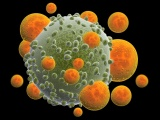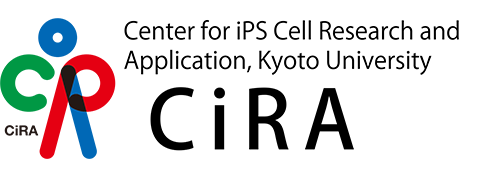

CiRA:ユニバーサルiPS細胞を開発:がん免疫療法(動画):
CiRA: Developed universal iPS cells: Cancer immunotherapy:
CiRA:已开发的通用iPS细胞:癌症免疫疗法
ー京都大学iPS細胞研究所(CiRA)ー
増殖分化機構研究部門
金子新教授:
王博研究員:研究グループは、ゲノム編集によりユニバーサルなiPS細胞を作製
- 他家iPS細胞の複数遺伝子を改変して、
- 拒絶反応が起こりにくい、
- ユニバーサルなiPS細胞を作製。
がん免疫療法に活用:
- ユニバーサルなiPS細胞を、
- T細胞に分化誘導することにより、
- 他家iPS細胞由来のT細胞を作製。
「このユニバーサルiPS細胞が、がん免疫療法に活用できること」を、明らかにした。
PVR遺伝子をノックアウト:
「これまで知られていた複数の遺伝子改変」に加え、
「NK細胞の制御に関連したPVR遺伝子をノックアウト」する。
NK細胞の攻撃から、より一層逃れやすいことを確認。
研究成果:
2021年5月18日、英Nature Biomedical Engineering誌オンライン版に掲載。
日経バイオテクONLINE
https://bio.nikkeibp.co.jp/atcl/news/p1/21/05/17/08165/
CiRA(サイラ) :iPS細胞×ゲノム編集
ーがん免疫療法のための”ステルスファイターT細胞”を作製ー
新たながん免疫療法:
新たに”ステルスファイターT細胞”を作製しました。
iPS細胞にゲノム編集を施し、移植先の免疫細胞に攻撃されないT細胞を作製。
T細胞にCAR遺伝子導入:
作製したT細胞にCAR遺伝子を導入し、腫瘍とヒトの免疫細胞を持つマウスモデルに移植。
観察すると、T細胞がヒト免疫細胞の反応を避けながら腫瘍を小さくしている様子が観察された。
ユニバーサルがん免疫療法:
本手法で作製したT細胞は、ドナーとレシピエントの型を合わせる必要がない。
- つまり、患者を選ばない、
- ユニバーサルながん免疫療法として、
- 広く活用できることが期待できる。
1. 要旨
がんの治療法の1つとして、T細胞を移植する免疫療法が注目されています。
患者さん自身の細胞ではなく、他人のT細胞を患者さんに移植する場合、レシピエントの免疫拒絶反応を制御する必要があります。
王 博 研究員(CiRA増殖分化機構研究部門)
金子 新 教授(CiRA同部門)
研究グループ:
先ず、iPS細胞にゲノム編集を施して、T細胞に分化させました。
- レシピエントの免疫細胞から攻撃を受けず、
- 尚且つがん細胞を攻撃する、
“ステルスファイターT細胞”を作製することに成功しました。
CiRA(サイラ) | 京都大学 iPS細胞研究所
https://www.cira.kyoto-u.ac.jp/j/pressrelease/news/210518-000000.html
Cancer immunotherapies for all patients
Cancer immunotherapies
have made the news for their startling effectiveness against certain cancers.
However, current clinical therapies
mainly use the patient’s own cells, limiting the number of patients who have access to this cure.
CiRA Professor Shin Kaneko
is developing iPS cells technology that would make cancer immunotherapies available to all patients.
In a new study, his research team
reports how gene editing iPS cells leads to a universal cancer immunotherapy that does not depend on the patient’s cells.
Cancer immunotherapies
describe a family of therapies that use the patient’s own immune system to fight cancer.In adoptive cell therapies,
immune cells found in the tumor are removed, processed to enhance their anti-cancer potency, and returned to the patient.“There is a lot of excitement about adoptive cell therapies. However, the processing takes time during which the patient’s condition worsens. Plus, depending on the patient’s condition, sometimes the cells cannot be used,”
explained Kaneko.
CiRA | Center for iPS Cell Research and Application, Kyoto University
https://www.cira.kyoto-u.ac.jp/e/pressrelease/news/210518-000000.html
Generation of hypoimmunogenic T cells from genetically engineered allogeneic human induced pluripotent stem cells |
Nature Biomedical Engineering